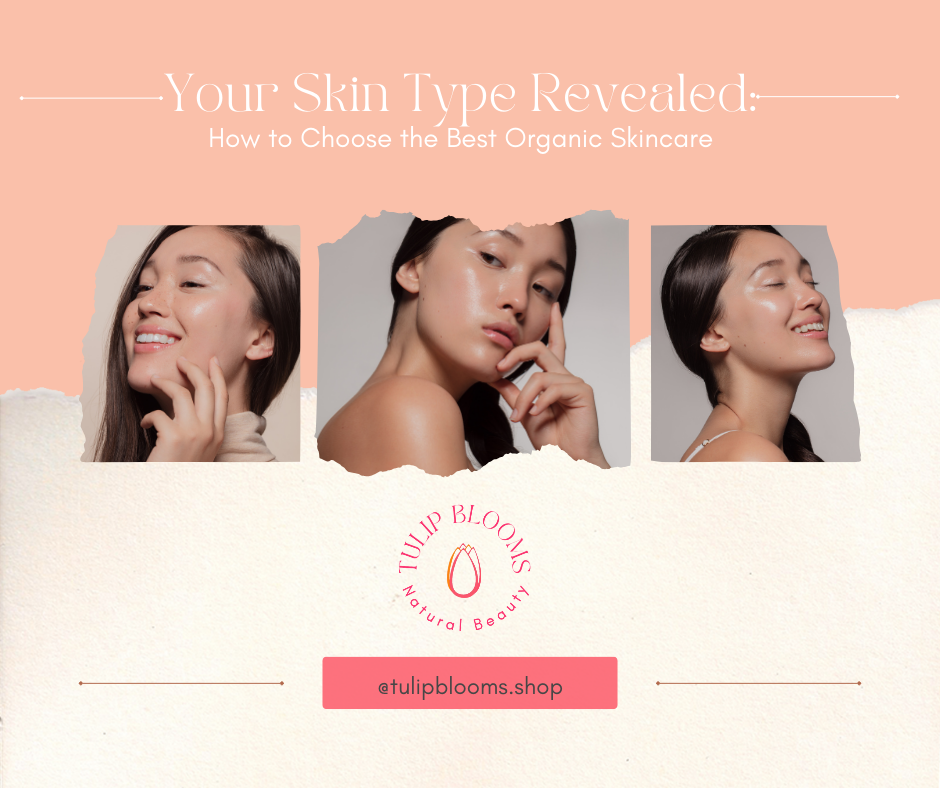Your Skin Type Revealed: How to Choose the Best Organic Skincare

Glowing, radiant skin is something we all strive for, but achieving that coveted complexion can feel like a constant guessing game. One of the keys to unlocking your skin's full potential is understanding your unique skin type. Knowing whether your skin is dry, oily, combination, or sensitive is crucial for selecting the right skincare products that will truly nurture and nourish your complexion. In this blog, we'll dive into the different skin types and share tips on how to identify yours to transform your skin with the power of organic, customized care.
Skin Type 1: Oily Skin
If your skin tends to look shiny or greasy throughout the day, especially on the T-zone (forehead, nose, and chin), you likely have an oily skin type. Oily skin is caused by overactive sebaceous glands that produce excess sebum, which can lead to clogged pores and breakouts. The good news is that oily skin is less prone to premature aging, as the natural oils help keep skin supple and hydrated.
Oily skin types, should look for oil-free, mattifying formulas that won't clog pores. Ingredients like charcoal, salicylic acid, and niacinamide can help control shine and unclog pores without stripping the skin. Lightweight, water-based moisturizers are also a great option to hydrate without adding excess oil.
Skin Type 2: Dry Skin
If your skin often feels tight, flaky, or itchy, you likely have a dry skin type. Dry skin is caused by a lack of natural oils and can be exacerbated by factors like harsh weather, indoor heating/cooling, and certain skincare ingredients. While dry skin may be more prone to fine lines and wrinkles, it's also less likely to experience breakouts.
For dry skin, seek out creamy, emollient formulas that are packed with nourishing oils and butters.
Skin Type 3: Combination Skin
If some areas of your face are oily (like the T-zone) while others are dry or normal, you have a combination skin type. This is the most common skin type, and it can sometimes be the trickiest to care for, as your needs vary across different zones.
When caring for combination skin, look for products that provide a balance of hydration and oil control. A mattifying primer or serum can help manage shine in oily areas, while a creamy moisturizer can hydrate drier zones. Exfoliating 1-2 times per week can also help slough off excess oil and dead skin cells.
Skin Type 4: Sensitive Skin
If your skin reacts easily to certain ingredients, fragrances, or environmental factors with redness, irritation, or breakouts, you likely have a sensitive skin type. Sensitive skin can be caused by a compromised skin barrier, genetics, or underlying conditions like rosacea or eczema.
Sensitive skin types should reach for gentle, fragrance-free formulas that avoid harsh chemicals and irritants. Incorporating probiotics, ceramides, and calming botanicals can also help reinforce the skin's natural barrier.
Identifying your skin type is the first step in building an effective, customized skincare routine. By understanding your unique needs, you can find organic products that will transform your skin from the inside out. Ready to get glowing? Explore our collection of curated, skin-type-specific sets to take the guesswork out of your regimen.





Leave a comment